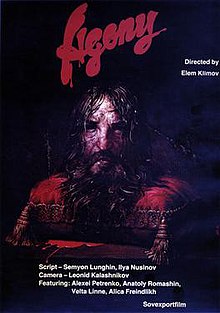Agony (film)
| Agony | |
|---|---|

Theatrical release poster
|
|
| Directed by | Elem Klimov |
| Produced by | Elem Klimov |
| Written by | Semyon Lungin Ilya Nusinov |
| Starring |
Alexei Petrenko Alisa Freindlich Velta Līne Anatoli Romashin |
| Music by | Alfred Schnittke |
| Cinematography | Leonid Kalashnikov |
| Edited by | Valeria Belova |
|
Production
company |
|
| Distributed by | Ruscico, Russia (current); Kino International (dvd, North America) |
|
Release date
|
1981 Venice Film Festival 1982 Czechoslovakia, Hungary, Poland 1983 Sweden, Great Britain, France 1985 Soviet Union, USA |
|
Running time
|
151 minutes (international release 1982) |
| Country | Soviet Union |
| Language | Russian |
Agony (Russian: Агония, translit. Agoniya; U.S. theatrical/DVD title Rasputin) is a film by Elem Klimov, made c.1973-75 and released in Western and Central Europe in 1982 (USA and Soviet Union 1985), after protracted resistance from Soviet authorities. The film is notable for its rich, sometimes baroque style, its sumptuous recreation of episodes from the final year of Imperial Russia and the psychological portraits of Grigori Rasputin and the Imperial family.
The storyline of the film follows the final months of 1916 up to the murder of Rasputin; some events have been telescoped into this time though they actually happened earlier, during the war. Rasputin's effect on people around him is shown as almost hypnotic, and the film avoids taking a moral stance towards him—breaking not only with Soviet history but also with how he was regarded by people near the court at the time, some of whom regarded him as a debilitating figure who disgraced the monarchy and hampered the war effort.
As evidenced by the scenography and photography, the resources for the film appear to have been lavish, but once finished the film was declared unsuitable for release; the reasons were evidently to do with the way the imperial family is portrayed. In this film Nicholas II is shown as weak and indecisive rather than brutal, and this did not square with the way the period had been retold in Soviet historiography and schoolbooks. Furthermore, the Bolsheviks make no appearance at all in the film, though it takes place during the final months of the empire, when the state was drifting toward revolution. This is historically truthful; the Bolsheviks had a very low level of activity in Russia during the First World War, most of their leaders were abroad or in prison and at the time they made no real, organized contribution to the unrest until after Lenin had returned in April 1917, by which time the Tsar had already been deposed. This was something Soviet history would not recognize; instead Lenin would be portrayed as the wise general of the upheaval from the start, and the Bolsheviks as the mass party of the working classes. Finally, the prominence of sexuality and sectarian religion in the film were hard to stomach for Soviet censors.
...
Wikipedia
